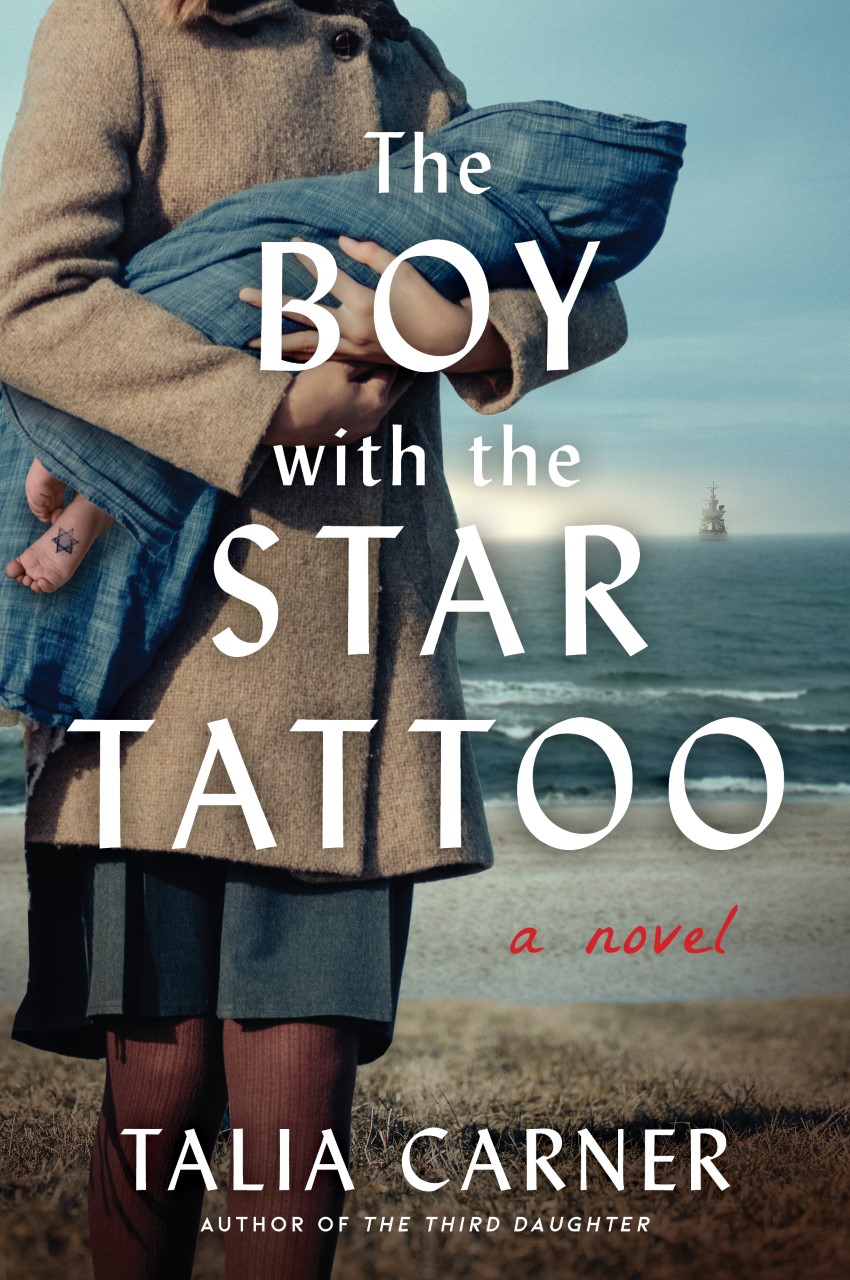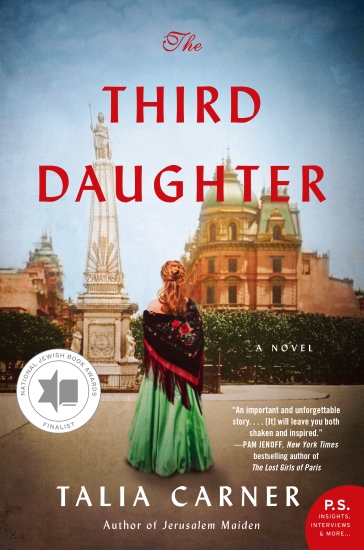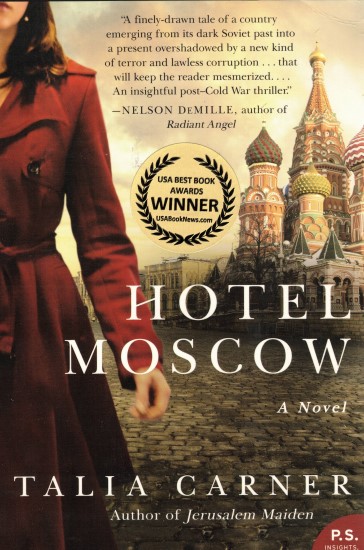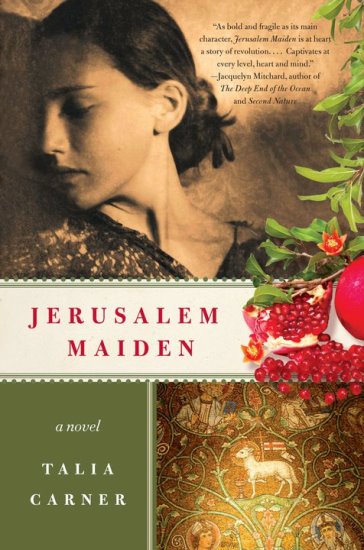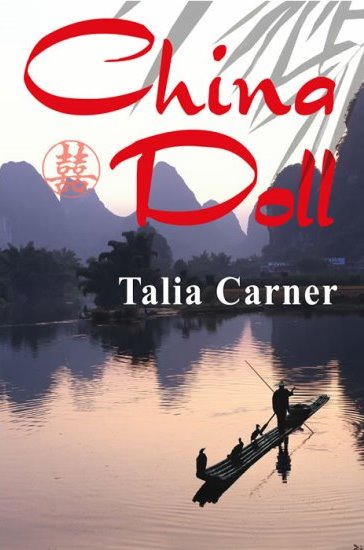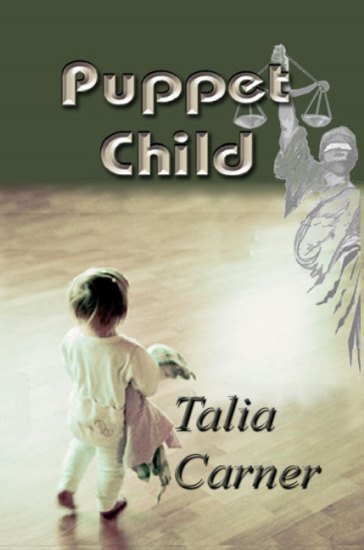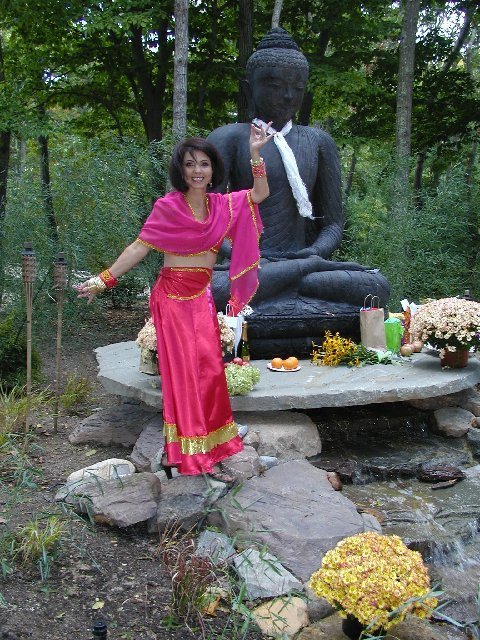 Q: You left a successful business career to become a novelist. What has prompted the change?
Q: You left a successful business career to become a novelist. What has prompted the change?
A: Stories find me, pull me, and don’t let me go until I am write them. That is what happened after I had been caught in the 1993 uprising of the Russian parliament against Boris Yeltsin. I had been there on my second mission that year to teach women entrepreneurial skills. Their valiant struggle for a foothold in a strange, new world was awesome and inspiring. On November 3rd, 1993, at 2:48 PM I sat down to tell the story of both their cries and triumphs—and launched a new career.
Q: It is common to begin writing fiction as a full-length novel rather than experiment with short stories?
A: I think in multi-layered plots, where characters and events are subject to the forces that shape our lives—psychological, geographical, political, religious or economic. I enjoy exploring the way the human spirit rises above all these forces, and a book-length fiction is the more natural form for me. I had never been a short stories reader, and it had never occurred to me to write them until I was a novelist. Between novels, I wrote a few short stories that won awards.
Q: Where do you get your inspiration for novels so vastly different from one another?
A: It doesn’t take much. Just a nugget of an idea—a half-uttered phrase, an errant thought, or a fraction of emotion that get coaxed in my head to full bloom. Characters come to populate my head already facing some specific issues.
Q: Those issues turn out to be ones that had not been explored in fiction.
A: Perhaps that’s why my character wonders about them….
Q: What about the old adage, “Write what you know?”
A: This is the worst writing advice ever uttered. Most of what each one of us knows can be squeezed into one book. Then what? Rather than write what I know, the exciting part of fiction writing is to study a subject I don’t know: the settings, the characters or the complex circumstances. As I embark on the journey with my character, I like to discover along with her the problems and pitfalls. The research is incredibly exhilarating, and it fuels my imagination with new plot twists.
Q: In the vein of the previous questions, most writers claim that they are in their books.
A: I am yet to appear in any of my novels. I do not write about myself because I am more fascinated by the notion of living inside another body and having a completely different set of reference points, from cultural allegories to music, food and dress. I am intrigued by the way physical landscape shapes the people who are either confined—or freed—by it. Think of an actress in a new role. I find it exciting to dip a ladle into the fountain of my own imagination and drink from it.
Q: Is there anything you do not fictionalize in your novels?
A: The physical settings or historical events must be authentic, and indeed I visit and study most of them. Most importantly, I need not invent the emotions I bring to each work from someplace familiar—be it the power of motherhood, the pain of a traumatic childhood, the quest for personal growth, the anguish of filial responsibility, the joy of love, or the struggle against social norms.
Q: You’ve been quoted saying “writing is not what I do, but who I am.” How much time do you spend writing?
A: These past couple of years I’ve disciplined myself not to work in the middle of the night, but my morning may start early. I’d like to dispel readers of the notion that a productive writing day results in so-many thousands of written words. In fact, “writing is rewriting,” and I spend 85% of my time researching, editing and revising. Ten hours may fly by as I am immersed in editing. It’s like being in a dream: you live it, you feel it, you see every detail—but you can’t stop to make a phone call and get back to the dream…. I truly enjoy the process. Yet, more than before, I now take half-days off for the business of life: dance or exercise classes, time with my husband, family and friends, or cultural- and cause-related activities.
Q: You didn’t start writing until after you had put in years in another career. Where, then, did writing come from?
A: I always wrote well for business: industry overviews, market analysis and promotional pieces, but the craft of turning out a book-length fiction is quite different. It needs to draw the reader psychologically and make sure that when the reader puts it down, she can’t wait to return to the story and keep company with the characters. I come from a long line of storytellers—my grandmother, my mother, and her sisters, and as early as second grade, I made up stories for my friends. Looking back, I can see that I also had a knack for language: growing up in Israel, at age six, besides Hebrew, I taught myself the English alphabet and began “collecting” words. I wrote them down in a notebook and knew hundreds of English-language words I was unable to put in a sentence. At age ten, I won the prestigious Bialik Award for Hebrew language. A few years later, as a teenager at Alliance Française high school, I selected French to write poetry.
Q: Since you have three languages to choose from. Why English?
A: I’ve been living in New York for over thirty years. I breathe and dream in English. Although I love reading Hebrew literature—it is incredibly rich in texture and grammar—I no longer live it. Since Esther, the protagonist of JERUSALEM MAIDEN took off to Paris and I had to follow her there, I revived my interest in French, but it is still not up to my prior command of the language.
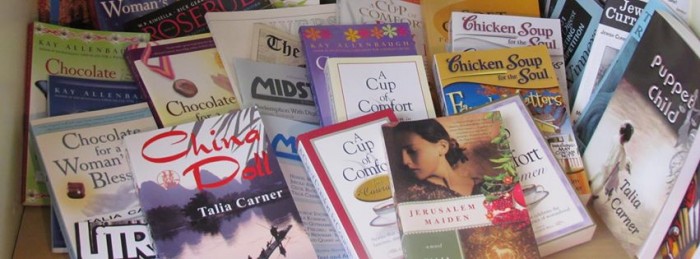
My published books and literary reviews
Q: Your bio mentions the corporate world. What did you do before becoming a full-time writer?
A: In the last chapter of my business career, I founded Business Women Marketing Corporation, a consulting firm whose clients were Fortune 500 companies. I offered consumer-product companies programs that reached the upscale career women’s market. Over $1,000,000 of the proceeds of my firm benefited professional women’s organizations that, in turn, invested in educating women in their respective industries. Further, we were the first to research and document in the late ‘80s the emerging segment of women entrepreneurs. As a result, I forced a debate on the government’s definition of female business ownership, which ultimately established the White House Oversight Committee and changed the way the Office of Labor Statistics gathered and analyzed its data.
Q: In your 1997 Wall Street Journal piece you weren’t enthusiastic about this new trend. Why?
A: In too many cases, entrepreneurship has become the new women’s ghetto—earnings lower than minimum wage, no benefits, and often large personal capital risk. It is unhelpful to glorify it without examining every situation closely.
Q: Women’s issues are the themes in your novels. Do you believe that the job of a writer is to educate?
A: I am not interested in climbing a soap box to preach to others, but rather, writing for me is another way of engaging in issues I care about.
Q: A reviewer of PUPPET CHILD hailed you as “an author with the power to change society,” which you did with the national launch of The Protective Parent Reform Act. CHINA DOLL gave you the opportunity to present gendercide at the U.N. What about JERUSALEM MAIDEN, and HOTEL MOSCOW, and what do you see coming for THE THIRD DAUGHTER?
A: PUPPET CHILD, set in Long Island, New York, is a protest against our justice system, which betrays and destroys children who come seeking its help. Trying to affect this system is somehow doable. CHINA DOLL is a cry against gendercide in numbers that are simply astounding, but it takes place in a foreign land, under a totalitarian government, among people accustomed to the devaluation of human life, and in a tradition where an girls are “maggots in the rice.” While I wrote and spoke about it, I also railed about organizations that were supposed to do this job, such as Human Rights Watch/Asia, and World Health Organization. For JERUSALEM MAIDEN, which takes place 100 years ago, I could only look into the future and speak and write about suppression of women around the globe. I see women’s education as the solution to their misery, but also to lifting whole societies out of poverty. HOTEL MOSCOW, I tackled the subject of secular Jewish-American identity. With THE THIRD DAUGHTER I have the unique opportunity to take the lesson from the pain and shame of the past and fight the evil of human sex trafficking. When speaking to audiences, I hope to inspire and educate them.
Q: Where does family fit in your life?
A: I have a great husband, Ron, whose tender care always created an incubator where I could grow and blossom in whichever direction I chose. I have two wonderful daughters and two stepchildren. Our four children and their spouses are all friends, which means that I have eight young people in my life. We enjoy each other’s company and spend time together. With babies they’ve produced these past few years, we make a happy, large family.
Q: Your novels are mostly set overseas. Doesn’t it complicate your work?
A: International settings are natural for me, as is thinking about big government or macro economies. Coming from a foreign culture that has absorbed people from around the globe—and having traveled, worked and lived abroad—I am fascinated by the cultural gradations that can only be observed by an outsider. Insiders often fail to see the uniqueness in their own customs or surroundings. Yet, there is universality of human emotions that is the common denominator crossing cultural boundaries. That is what I bring out in my writing.
Q: You served in the Israeli army.
A: I’m still unable to write well about that experience. Imagine an eighteen-year-old sending a reserve officer on an assignment—he’s already married, has a couple of kids—and then this eighteen-year-old gets his file back, assigned to Unit 2. This was the morgue. The older I get, the less I am able to cope with the magnitude of such a loss and wonder how the family survives emotionally and psychologically.
Q: The talent for visual expression runs in your family. Will you ever tap into your own?
A: Yes, my mother was a successful artist who painted and sold literally thousands of paintings. Her mother’s untapped artistic genius was my inspiration to write JERUSALEM MAIDEN. I too, can sculpt, and used to draw well. But if there is life after life, I want to come back as a singer and a stand-up comedienne. Maybe also dancer, which tops my list of artistic love, but one most limited by physical ability and age.
Q: What’s your next novel?
A: My next novel, scheduled to be released in September 2019 by HarperCollins, is THE THIRD DAUGHTER. It’s a story of tango and prostitution in Buenos Aires at the end of the 1800s. In the meantime, I readers can have a satisfying reading experience with any of my previous four novels.
